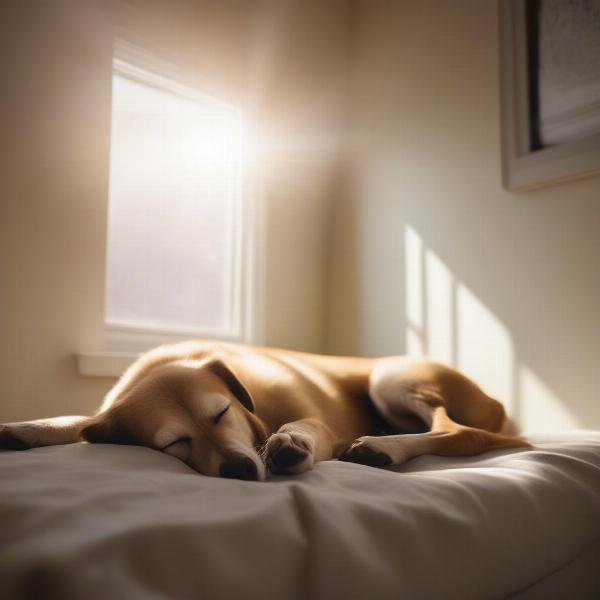Dog panting is a common sight, especially after a playful romp in the park. But what if your furry friend is panting while asleep? Is it a cause for concern or just a normal part of their sleep cycle? This article will delve into the reasons behind dog panting while asleep, helping you differentiate between normal behavior and potential health issues.
Understanding Why Dogs Pant
Panting is a dog’s primary way of regulating their body temperature. Unlike humans, who sweat to cool down, dogs rely on the evaporation of moisture from their tongues and respiratory system. This rapid, shallow breathing helps them dissipate heat and maintain a comfortable body temperature.
Normal Reasons for Dog Panting While Asleep
Sometimes, panting during sleep is perfectly normal. If your dog is experiencing a particularly vivid dream, they might pant as they act out the dream sequence in their sleep. Similarly, a warm room or a thick blanket can elevate their body temperature, leading to panting as they try to cool down.  Dog sleeping in a warm room This is especially true for brachycephalic breeds (dogs with short noses, like Bulldogs and Pugs) who are more prone to overheating.
Dog sleeping in a warm room This is especially true for brachycephalic breeds (dogs with short noses, like Bulldogs and Pugs) who are more prone to overheating.
When Panting Might Signal a Problem
While occasional panting during sleep isn’t usually a cause for alarm, persistent or heavy panting could indicate an underlying health issue. Some potential causes include:
- Respiratory problems: Conditions like pneumonia, asthma, or heart disease can make breathing difficult, leading to panting.
- Pain: If your dog is experiencing pain, they might pant as a response.
- Anxiety or stress: A change in routine, loud noises, or separation anxiety can trigger panting, even during sleep.
- Heatstroke: This is a serious emergency that requires immediate veterinary attention. Signs of heatstroke include excessive panting, drooling, weakness, and vomiting. dogs breathing fast when sleeping
- Cushing’s disease: This hormonal disorder can cause increased thirst and panting.
- Anemia: Low red blood cell count can make it harder for the body to carry oxygen, leading to increased respiratory rate and panting.
What to Do If Your Dog Is Panting Heavily While Asleep
If you notice your dog panting heavily or exhibiting other unusual symptoms while sleeping, it’s crucial to consult a veterinarian. They can perform a thorough examination to determine the underlying cause and recommend appropriate treatment.
Is it normal for my dog to pant a little while sleeping?
Yes, occasional light panting during sleep can be normal, particularly if the dog is dreaming or the environment is warm.
How can I tell if my dog’s panting is a sign of a problem?
Persistent, heavy panting, especially when accompanied by other symptoms like restlessness, drooling, or vomiting, warrants a veterinary check-up.
What should I do if my dog is panting excessively and seems distressed?
Contact your veterinarian immediately, as this could be a sign of a serious condition like heatstroke.
Can medications cause panting in dogs?
Certain medications, such as steroids, can cause panting as a side effect. Always consult your vet about any potential side effects of your dog’s medications.
How can I help my dog sleep more comfortably and reduce panting?
Ensure a cool, quiet sleeping environment, provide fresh water, and consider using a cooling mat during warmer months.
My senior dog has started panting more in his sleep. Should I be worried?
Age-related changes can sometimes affect breathing patterns. It’s best to consult your vet to rule out any underlying health issues.
My dog is panting in his sleep and twitching. Is this normal?
While twitching during sleep can be a normal part of dreaming, combined with panting it could also indicate discomfort or pain. Consult with your veterinarian to ensure everything is alright.
Expert Insight:
“Panting during sleep can be tricky to interpret,” says Dr. Emily Carter, DVM. “While mild panting is often benign, consistent heavy panting can be a red flag. A vet visit is always recommended if you’re concerned.”
Dr. Michael Davis, a veterinary behaviorist, adds, “Anxiety and stress can also manifest as panting during sleep. Creating a calm and predictable bedtime routine can help alleviate these issues.”
Related Articles:
About ILM Dog:
ILM Dog is your trusted international resource for expert advice on all aspects of dog care and wellbeing. We offer practical guidance on dog breeds, health, training, nutrition, grooming, and much more, catering to both novice and experienced dog owners worldwide. Whether you’re looking for help with choosing the right breed, understanding your dog’s behavior, or providing the best possible care, ILM Dog is here to support you. Contact us today for personalized advice and support: Email: [email protected], Phone: +44 20-3965-8624.